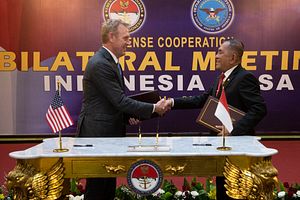Last week, Acting U.S. Defense Secretary Patrick Shanahan paid his first visit to Indonesia since assuming his current position. The visit, which was part of a broader Asia tour, highlighted efforts by both sides to continue to boost U.S.-Indonesia defense relations despite lingering challenges and uncertainties.
As I have noted before in these pages, the United States and Indonesia share a defense relationship that has included components such as visits, exchanges, and regular exercises, with previous major restrictions in place in the 1990s largely lifted under the George W. Bush administration. Despite some changes, U.S. policymakers across administrations have recognized that Indonesia – the world’s largest archipelagic state and biggest Muslim-majority country – is a significant actor in Southeast Asia and an important partner in addressing challenges ranging from maritime security to Islamic extremism.
That recognition has continued on under the Trump administration as well, despite some challenges and uncertainties for both sides, including the U.S. position on the Israel-Palestine issue and heightening U.S.-China competition, which has raised anxieties for some Southeast Asian states. Last January, during a visit by then-U.S. Defense Secretary James Mattis, both sides highlighted several areas for collaboration including counterterrorism, intelligence sharing, and maritime security, with Indonesia being an interested party in the South China Sea disputes. And in 2019, as both sides commemorate the 70th anniversary of the establishment of their diplomatic relations, we have continued to see some manifestations of the developments in ties, be it military sales or exercises.
Last week, the defense relationship was in the spotlight again with the visit of U.S. Acting Defense Secretary Patrick Shanahan to Indonesia. Shanahan’s visit to Indonesia, which was his first since he assumed the position in January 2019, was part of a broader trip that also included Japan, South Korea, and Singapore, where his debut appearance at the Shangri-La Dialogue coincided with the release of the U.S. Indo-Pacific Strategy Report.
During his visit, Shanahan met with Indonesian Defense Minister Ryamizard Ryacudu, where they discussed a range of issues within the bilateral relationship as well as broader regional and global issues of common interest. They also discussed general areas where defense collaboration could be improved, with a case in point being boosting information sharing using the Association of Southeast Asian Nations Our Eyes (AOE) platform that Indonesia has led in helping establish.
Unsurprisingly, the headline-grabbing item in the discussions between the two sides was ongoing efforts to normalize relations between the United States and Indonesian Special Forces (KOPASSUS), which was also a topic of conversation during Mattis’ visit last year. Per the official joint statement released by both sides following the visit, both sides agreed to “normalizing the Army special forces’ relationship” with a joint combined exercise training with Indonesia’s KOPASSUS special forces beginning in 2020.
To be sure, Shanahan’s visit was just one in a series of ongoing interactions between the two sides. But as both the United States and Indonesia shape their wider foreign policies through the rest of 2019 and into 2020, such individual manifestations of the defense relationship between the two sides will continue to be important to monitor in order to get a sense of how rhetoric is translating into reality over time.

































